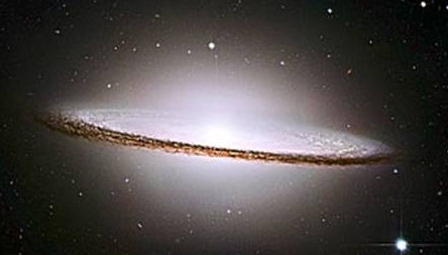
(Photo taken by the Hubble Space Telescope)
The name of the galaxy comes from the curious and, to scientists, very surprising fact that apparently all of its residents speak Spanish. (The pope gave Portugal absolutely nothing in this case.)
In his foreword to Geraint F. Lewis and Luke A. Barnes, A Fortunate Universe: Life in a Finely Tuned Cosmos (Cambridge: Cambridge University Press, 2016), Brian Schmidt, who shared the 2011 Nobel Prize in Physics with Saul Perlmutter and Adam Riess for providing evidence that the expansion of the universe is accelerating, writes as follows:
“Like a Bach fugue, the Universe has a beautiful elegance about it, governed by laws whose mathematical precision is meted out to the metronome of time. These equations of physics are finely balanced, with the constants of nature that underpin the equations tuned to values that allow our remarkable Universe to exist in a form where we, humanity, can study it. A slight change to these constants, and poof, in a puff of gedanken experimentation, we have a cosmos where atoms cease to be, or where planets are unable to form. We seem to truly be fortunate to be part of Our Universe.
“A seemingly perfectly rational argument to come to terms with this streak of good luck is that, since we exist, we must therefore live in a Universe where we can exist. But this idea has at its heart the notion that ours is selected from a multitude of universes — and there is no evidence for, or against, such a construct of nature.
“Our Universe is the only one we have, and this presents a remarkable problem for those of us who study it. Why is it the way it is? Science is founded on using ideas, often called theories, to make predictions. But what happens when, as with our Universe, there is only one thing to observe? . . .
“On your journey with Geraint and Luke, you will see that humanity appears to be part of a remarkable set of circumstances involving a special time around a special planet, which orbits a special star, all within a specially constructed Universe.” (xi-xii)
***
Had you ever heard of the Planetary Protection Office? I have to admit that it sounds like something out of Men in Black.
But it exists, and it’s actually both important and interesting:
“Why planetary protection means Cassini must die”
I now know what I want to be when I grow up: a Planetary Protection Officer.
***
In response to my post the other day about Brian Clegg’s Are Numbers Real? somebody — and I’m embarrassed to say that I no longer recall who it was, because I should thank him or her — called this TEDEd presentation to my attention:
“Is math discovered or invented?”












